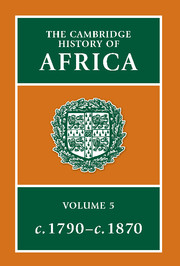Book contents
- Frontmatter
- Introduction
- 1 Egypt and the Nile Valley
- 2 Ethiopia and the Horn
- 3 The Maghrib
- 4 The nineteenth-century jihads in West Africa
- 5 Freed slave colonies in West Africa
- 6 West Africa in the anti-slave trade era
- 7 The forest and the savanna of Central Africa
- 8 East Africa: the expansion of commerce
- 9 The Nguni outburst
- 10 Colonial South Africa and its frontiers
- 11 Tradition and change in Madagascar, 1790–1870
- 12 Africans overseas, 1790–1870
- 13 Changing European attitudes to Africa
- Bibliographical Essays
- Bibliography
- Index
- References
13 - Changing European attitudes to Africa
Published online by Cambridge University Press: 28 March 2008
- Frontmatter
- Introduction
- 1 Egypt and the Nile Valley
- 2 Ethiopia and the Horn
- 3 The Maghrib
- 4 The nineteenth-century jihads in West Africa
- 5 Freed slave colonies in West Africa
- 6 West Africa in the anti-slave trade era
- 7 The forest and the savanna of Central Africa
- 8 East Africa: the expansion of commerce
- 9 The Nguni outburst
- 10 Colonial South Africa and its frontiers
- 11 Tradition and change in Madagascar, 1790–1870
- 12 Africans overseas, 1790–1870
- 13 Changing European attitudes to Africa
- Bibliographical Essays
- Bibliography
- Index
- References
Summary
THE EUROPEAN PRESENCE IN AFRICA
The history of every continent is the product of a complex amalgam of forces, some of internal, others of external origin. In Africa, where the technique of literacy was introduced to most indigenous communities only in comparatively recent times, the exploits of outsiders are far more richly documented than those of local people. Thus there exists a bias tending to overstress the importance of external influences inherent in most of the written material available to the student of the African past, a bias that needs constantly to be corrected by an imaginative awareness of the achievements of African societies in developing their own varied and elaborate cultures. Obviously modern Africa has been profoundly affected by the techniques, the institutions and the ideas introduced by men and women of European origin; but in historical terms the impact of Europe must be regarded as a relatively recent development, to be measured in most parts of the continent in terms not of centuries, but merely of decades. When this comparatively brief involvement with Europe is set against the long span of intercourse with Asia, it becomes clear that Africa, at least until the end of the eighteenth century, was far more deeply affected by the greater of her two continental neighbours.
For it was from Asia that there had come, probably as early as the sixth millennium BC, the revolutionary techniques of cereal cultivation and of pastoralism. Later innovations of Asian origin, each capable of exercising a profound influence on the lives of those who adopted them, included the craft of iron-working, the camel, the banana, the largest of the yams and a variety of other food-crops.
- Type
- Chapter
- Information
- The Cambridge History of Africa , pp. 458 - 496Publisher: Cambridge University PressPrint publication year: 1977
References
- 1
- Cited by

